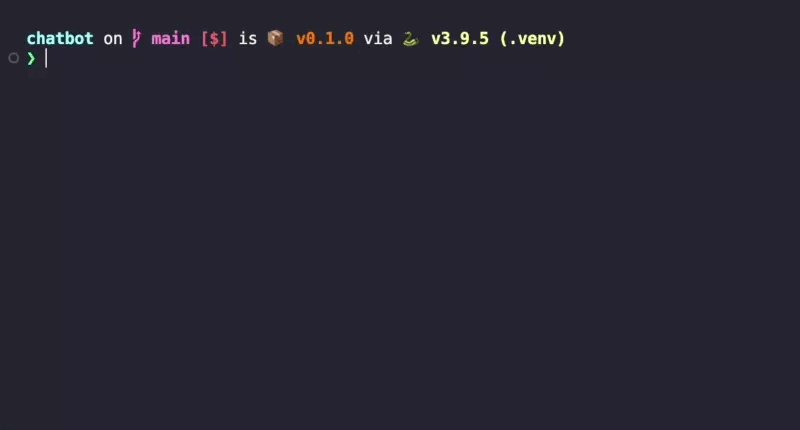A Python chatbot that learns as you speak to it.
Project description

Thomas the Chatbot
Installation
Python 3.9+ is required
This package can be installed from PyPi with:
pip install thomasthechatbot
Usage
Basic Usage
from ttc import Chatbot, Context, download_nltk_data
# Only needs to be run once (can be removed after first run)
download_nltk_data()
# Creating the context
ctx = Context()
# Initializing the chatbot
chatbot = Chatbot()
talk = True
while talk:
msg = input("You: ")
if msg == "s":
talk = False
else:
# Getting the response
resp = chatbot.respond(ctx, msg)
# Saving the response to the context
ctx.save_resp(resp)
print(f"Thomas: {resp}")
# Saving the chatbot data
chatbot.save_data()
Configurations
chatbot = Chatbot(
path="brain",
learn=False,
min_score=0.5,
score_threshold=0.5,
mesh_association=0.5,
)
CLI
Type ttc to begin talking to Thomas.
How does Thomas work?
Thomas has no hard-coded responses and is designed to “learn” as he is spoken to.
Note: I created this approach based on my intuition and not a proven method.
Data Storage
Thomas does not come up with his own responses, he reiterates those that he has seen before.
Responses
Previous responses are stored in resps.json as a dictionary where the key is a generated UUID and the value is the tokenized response.
Mesh
Prompts are associated with responses through a "mesh" which is stored in mesh.thomas. The mesh consists of a dictionary where the key is the UUID of the prompt and the value is a "link". Links associate responses to patterns of words, they have the following attributes:
stop_words: set
Stop words separated from the tokenized prompt.
keywords: set
The remaining words which are lemmatized by their part of speech.
resps: dict[str, set]
Responses to the prompt where the key is the response UUID and the value is a set of mesh ids from the previous prompt.
Querying Responses
Tokenizing Prompts
Before tokenization, prompts are lowercased, contractions are expanded and punctuation is removed. This aids in improving the consistency and accuracy of queries. Prompts are tokenized by word and split into key words and stop words.
Ignoring Responses
The user's prompt and chatbot's previous response are ignored to prevent the chatbot from appearing repetitive.
Initial Query
Meshes are initially queried by their score which can be calculated with:
(ss / 2 + sk) / (ts / 2 + tk - ss / 2 - sk + 1)
ss = shared stop words
sk = shared key words
ts = total stop words
tk = total key words
This formula weighs shared key words 2 times more heavily than stop words by dividing ss and sk by 2. It also takes into account the total number of words resulting in more precise meshes being favoured.
First Discard
Meshes with scores below a threshold (min_score) are discarded.
No Results Queried
If no results remain, meshes are queried by the number of shared stop words.
Second Discard
The remaining meshes are sorted and meshes that fall below a percentage threshold (score_threshold) of the best score are discarded. Considering multiple meshes increases the variety of responses.
Mesh Association
Meshes are associated with each other by the percentage of shared responses (mesh_association). Associated meshes for each queried mesh are found and added to the list. This process prevents less trained prompts from having a small response pool.
Choosing a Response
If responses are found to share the same previous message UUID as the prompt, all non-sharing responses are moved. Responses are chosen at random from the remaining responses. Random selection prevents the chatbot from being predictable.
Contributing
Open to contributions, please create an issue if you want to do so.
Formatting
Project details
Download files
Download the file for your platform. If you're not sure which to choose, learn more about installing packages.
Source Distribution
Built Distribution
Hashes for thomasthechatbot-1.0.1-py3-none-any.whl
| Algorithm | Hash digest | |
|---|---|---|
| SHA256 | 888649d6bca577b8fce8e29efbf5d568c444fb90fcd32803884f9740837e5639 |
|
| MD5 | 1b637457f53f1a9adb54554d1792ce86 |
|
| BLAKE2b-256 | 9e8cbfb1c05f4d709f25c437d9fc1c02ecf8e35d0fd392aaca45af5cdaa2d3b1 |












